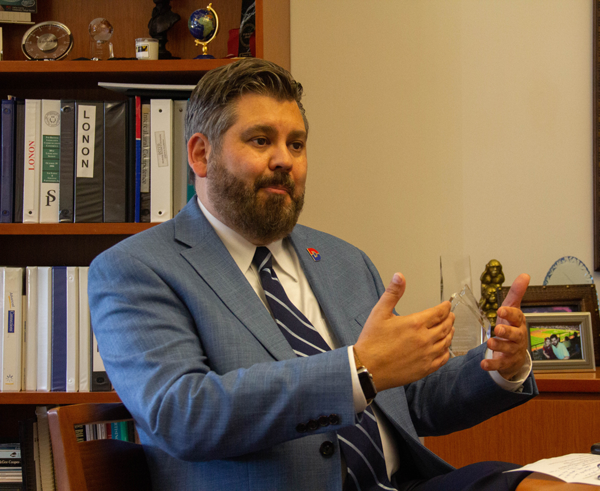Dallas College 2030 plan looks to the future

Justin Lonon took over the leadership of Dallas College on March 1. Photo by Rory Moore/The Et Cetera
April 5, 2022
Chancellor Justin Lonon’s Dallas College 2030 Plan is designed to address employee concerns following the college-wide reorganization.
More information will be given at the April 13 virtual town hall at 10 a.m.
“It is a framework that really allows us to focus on what are some of those aspirational goals that we want to look towards over the next several years,” Lonon said.
Lonon said the Dallas College 2030 Plan involves measurable short-term goals and key performance indicators to keep the college on track. It is also a transparent way for employees to see the direction Dallas College is moving.
Specific goals and key performance indicators are still in the development phase.
Lonon said one of his goals is to boost employee morale, and he’s going to be asking for employee feedback.
“Knowing some of the pain points that we still have internally through the consolidation, from an employee standpoint, I want to position us to be identified as one of those best places to work,” Lonon said.
[READ MORE: Justin Lonon plans to use experience, connections as college’s chancellor]
Corine Burnett, information desk representative for Information Central, said the changes that are being implemented are just going to take time.
“I think they’re trying to do it, it’s just that it’s new,” Burnett said. “Everything is new so it’s going slow. But I think they’re going to work it out.”
The second phase of the Dallas College 2030 Plan, Action 2022, involves initiatives to be implemented this year.
According to Lonon, some of these short-term goals are making sure there is a human resource presence on every campus and improving campus signage.
Lonon said the bottom line is making Dallas College a place where students and employees feel supported.
“In the short run, we want to make sure that students have access to what they need,” Lonon said. “Can they get the classes they need, where
they need them, when they need them?”
As part of making courses more student friendly, Lonon said the college is working to develop some completely online programs for working students.
They will also look at the mix of 16-week and 8-week courses to make sure there are sufficient flex-term classes available.
Lorie Vazquez, a business major who returned to Eastfield after 20 years to finish her degree, said flex-term classes are ideal for her situation and will allow her to finish her degree in less than two years.
“[I’m] a single parent, a busy mother,” Vazquez said. “I’m an adult paying a mortgage, paying bills, and it’s very hard for me to take a
16-week course versus that flex class.”
Lonon said another part of supporting students is making sure the college provides adequate social services.
“We know childcare is an issue,” Lonon said. “Access to health care in general and access to mental health services. So when I talk about we’re in the barrier-busting business, we’re going to continue to do that and ensure that students feel a sense of a welcome place, a sense of togetherness.”
[READ MORE: Student Care Network offers new resources]
For employees, Lonon said building campus community is a priority.
“That has been disrupted,” Lonon said. “Certainly as things were moved around during the transition and . . . during the pandemic as everyone was scattered.”
Admissions specialist Joselyn Valenciano said improved communication from the administration down would help employees.
“It would be nice if [information] was relayed as soon as possible down to us, especially with all these changes that are happening,” Valenciano said.
Valenciano said she’s seeing more students get involved on campus. There are more events for them to participate in now, and students she
talks to say they are joining campus clubs.
Education major Lisa Cooper said she feels supported as a student.
“I feel like [the college is] really nice,” Cooper said. “I see that they’re very diverse, which is really good.”
Education major Nathaniel Rodriguez also said he’s had a good experience at Dallas College.
“One of [the employees] approached me about Hispanic . . . students getting scholarships and financial aid and stuff like that,” Rodriguez said. “I thought that was really cool. The counselor’s office [also] approached me.”
Lonon said the Dallas College 2030 Plan is centered around what he feels is important in building culture for a place employees would want to work and students would want to go to school.
“That is something that I’m going to be spending a lot of time on, on building the Dallas College culture,” Lonon said. “That’s a multi-year initiative. That is ongoing.”


